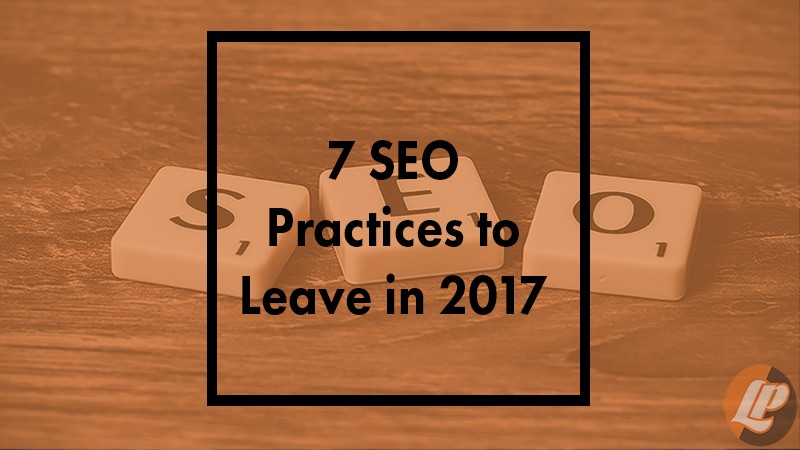Search Engine Optimization (SEO) is a digital marketing practice that has been around since the mid-90s. SEO is defined as “the process of optimizing a website so that it can be quickly found and indexed by a search engine.” How you (or the company that handles your SEO for you) go about optimizing your website has evolved tremendously since the mid-90s. There are ways of optimizing and viewing results that have been outdated, and not just since the mid-90s, outdated as of 2017. Check out our list of techniques, strategies, and practices that should be left behind in 2017.
What to Leave Behind
Ignoring Technical Errors
Technical errors can include a number of things regarding your website: 404 pages, broken links, duplicate content, improper redirects, slow load time. Some view these as non-issues because they don’t directly tie to content and keywords, which couldn’t be more wrong. Technical issues like this are negative in the eyes of Google your site’s ranking will be affected because of it. So, no matter how great your website content is, if you have multiple technical errors within your site, temper your SEO expectations until those errors have been addressed.
Not Optimizing Images
Optimizing images is one of the most overlooked SEO techniques. Many times, image optimization is overlooked because it’s been around for so long, that many deem it outdated or it’s not of importance. By not optimizing your images you’re missing out on an opportunity to show up in search results.
Adding Bad Content for the Sake of Adding Content
There’s a saying in the digital marketing/website world that says, “content is king.” This is true, but it carries a caveat. The two are intertwined with one another, meaning that SEO can’t happen without content. However, putting content on your website just for the sake of putting content on your website is quite frankly lazy and a waste of time. All website content should be well thought out and considered to be of high quality, especially when compared to your competition.
Multiple Pages for Keyword Variations
Thankfully we are to the point in SEO’s evolution where we no longer have to optimize one page for one keyword. Google is smart enough to know the topic of each page eliminating the need to have multiple pages for different variations of the same keyword. For example, a website doesn’t need to have four pages about “plumbing in Traverse City.” You don’t need four pages titled, Plumbers in Traverse City, Traverse City Plumbers, Traverse City Area Plumbers, and Plumbers in the Traverse City Area, Google understands that all these pages mean the same thing. Therefore you only need to have one page.
Trying to Trick Google
As just mentioned above in “number 4,” Google is extremely smart. Through sophisticated algorithms, they know and understand quite a bit. Good SEO is achieved through earning your rankings, not taking advantage of the system. More often than not, Google will catch on to people attempting to trick the system, and their site drops drastically in rankings as a result. A prime example of this is changing the dates on previously published blogs or articles. Manipulating the publish date of a blog or article may help rankings immediately. However, Google will eventually figure it out, and the algorithms will decrease your rankings as a result.
Using Keyword Rankings as the Main Measurement of Success
In 2018, there are too many contributing factors to use keyword rankings as your main measurement of success solely. Instead, dig deep into your website analytics. Within analytics, you’ll be able to tell the quality of your traffic, your conversion rates, and which pages people are going to. This will show you the value of your keywords.
Not Staying Up to Date on SEO Trends
SEO is an ever-evolving process. Google is continually changing their SEO ranking algorithms and staying on top of those algorithms is essential. Make a habit of reading about algorithms changes at least once a month, that way you won’t be left behind. Industry blogs, experts on Twitter, webinars, and even attending conferences are great ways to stay on top of things.

